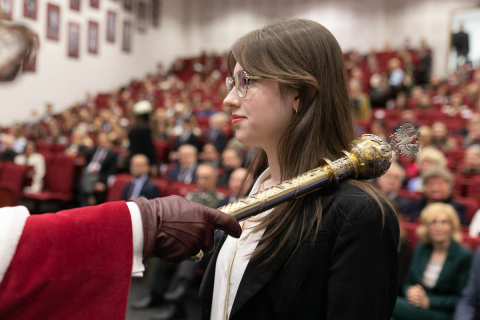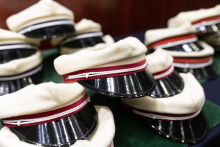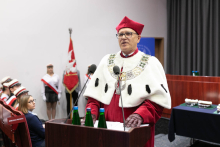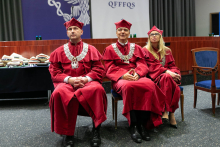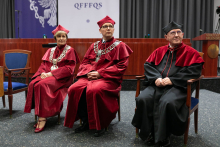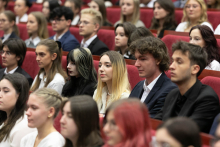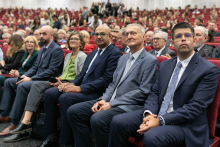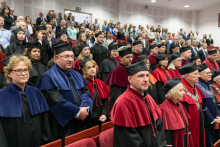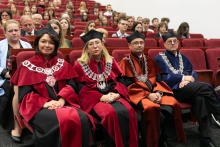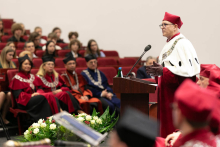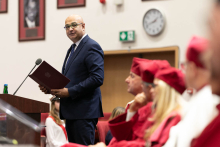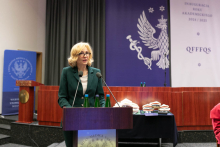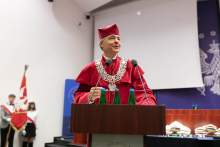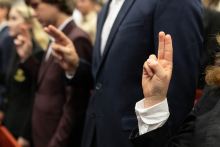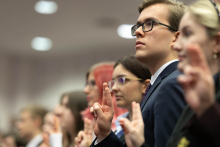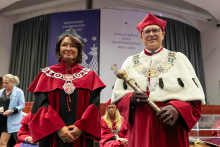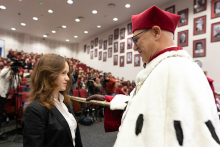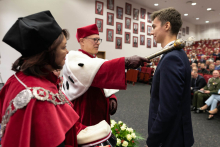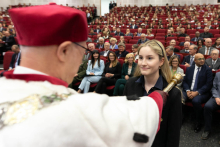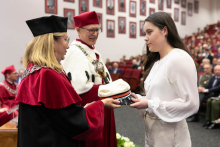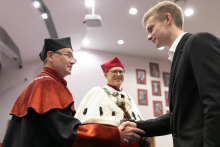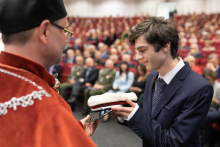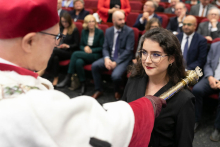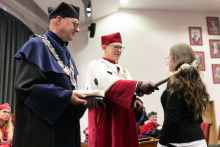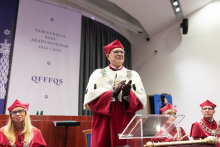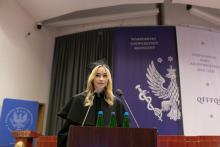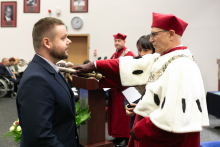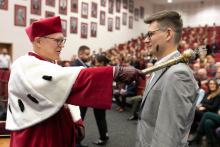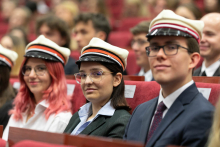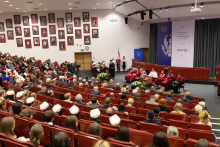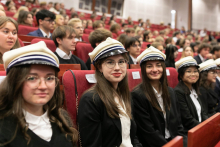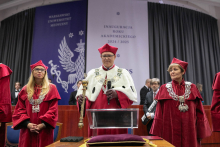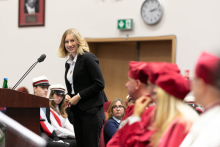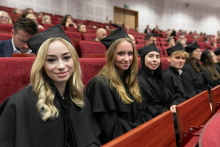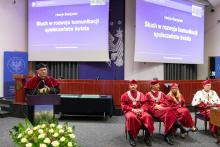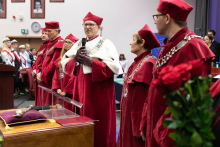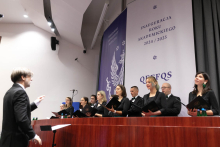The university's most important ceremony, which took place on October 7 in the Prof. Janusz Piekarczyk auditorium at the Didactic Center, was attended by representatives of the entire MUW academic community, including newly admitted students and doctoral students, as well as many distinguished guests. The event was hosted by Prof. Rafal Krenke Rector of MUW.
We are in the vanguard of change
Rector Prof. Rafal Krenke stressed that the beginning of the academic year brings with it hopes, plans and dreams. For students, this includes gaining new knowledge and skills, for academic teachers: getting students interested in the subject they teach and achieving satisfaction with their results, for researchers - efficient implementation of scientific projects or obtaining funding for new research. While making plans, however, one cannot overlook potential risks, so, as the Rector pointed out, the efficiency of the university's management at various levels is extremely important.
- I will try to provide you with such efficiency and appropriate decision-making by cooperating with both the university's supervisory bodies and its collegiate bodies: the senate, the university council, the faculty councils or the councils of scientific disciplines. At the same time, I will strive to ensure that these are not the only platforms for discussion, searching for compromises and building mutual understanding and trust, just because the need for such actions clearly resounds in the conversations taking place at the university - Professor Krenke said.
The Rector assured that the Medical University of Warsaw is and will remain a rapidly growing medical school and research center, as well as one of the highest-rated medical universities in the country and abroad. MUW currently teaches more than 10,000 students, including 700 from abroad. They can develop their scientific passions in 280 scientific circles, while they are educated by a dedicated teaching staff of 1,900 academic teachers. Teachers who are also scientists, who in 2023-2024 published more than 3,500 articles in prestigious journals, and were authors of 114 books and 1,077 chapters, as well as medics, who provided nearly 700,000 consultations and recommended more than 170,000 hospitalizations at the MUW teaching hospitals.
- These figures that I have quoted to you give a picture of the enormous potential, as well as the commitment of our employees to the beautiful and noble mission of saving health and life. This mission reaches far beyond the walls of our university. We want to have an impact on global health and responsibly address challenges such as sustainable development or population health - the Rector emphasized - Dear first-year students, you are just becoming part of this community. A community that is not afraid of challenges and that sets the course of development. Do not limit yourselves to knowing what we already know, what your teachers know and are able to pass this knowledge on to you. Ask questions, create new solutions, develop your talents. Our university is a place that is constantly evolving. Working across medical disciplines, we are directing our efforts to make the medicine of the future more precise, innovative and accessible to everyone. We are in a time of breakthrough, even breakthroughs: personalized healthcare, gene therapy, surgical robotics, artificial intelligence in diagnosis and treatment. All of this is happening here and now, and we have the satisfaction and responsibility not only to participate in it, but also to be in the vanguard of change. We want each of you, when you leave our walls, to feel that you have a real impact on the future of medicine, pharmacy and public health.
Finally, the Rector addressed university employees:
- I would like to express my great respect and thanks to each and every employee of our university - I deliberately do not say all, but each and every one of you, because I would like my words to go to each and every one of you - for daily work and commitment, which allow us to develop our university and direct our university towards the future.
Congratulations from guests
The attendees also listened to a congratulatory letter from the President of the Republic of Poland, delivered by Alwin Gajadhur, advisor to the President. “It is a beautiful and joyful moment, as every year hundreds of thousands of young Poles take up studies at universities. I observe with appreciation the development of existing university and polytechnic centers, as well as the emergence of new schools and fields of higher education on the academic map of Poland. I proudly welcome the successes of students and young scientists who win honorable laurels and gain recognition for their discoveries and achievements, but also for Polish science as a whole. I warmly congratulate the winners of prizes and awards in national and international competitions. On the threshold of the new academic year, I wish all of you satisfaction in acquiring new skills and discovering the secrets of knowledge. I wish that this special synergy, which is born in the meeting of talented young people with enthusiastic creative lecturers, continues to open new horizons of endless possibilities for you” - President Andrzej Duda wrote.
Prof. Urszula Demkow, Undersecretary of the Ministry of Health, also spoke.
- On behalf of Minister Izabela Leszczyna, I convey my congratulations and wishes for success in carrying out fruitful work for the benefit of the entire academic community. I also join in these wishes with a deep belief that it is possible to realize the academic ethos, that it is important to take care of the university and its good name and respect the democratic rules of its operation - Professor Demkow said, adding: - The purpose of academic education is to impart knowledge and skills, but also to train ethical attitudes of future medical personnel.
“I accept you as a Student of the University”
At MUW the 2024/2025 academic year begins with 3203 new students. The symbolic beginning of their journey is matriculation, i.e. the act of being accepted as students of the university. The words of the student oath were read by Prof. Marek Kuch, Vice Rector for Student Affairs and Education. The students gathered in the auditorium vowed to persevere in their pursuit of knowledge, professional and personal development, but also to care - with all their conduct - for the dignity and honor of a student of the Medical University of Warsaw. Then the Rector, accompanied by Deans and Vice Deans, tapped on the shoulders of 17 people who achieved the highest scores during this year's recruitment with a scepter. They were: Karolina Dąbrowska, Stanisław Karpiejczyk, Maciej Leszczyński, Pola Ochocka, Piotr Olbryś, Olga Nowacka, Gabriela Ścibior, Aleksandra Woźniak, Maria Kamińska, Zuzanna Pątek, Mateusz Mazurek, Szymon Kotecki, Kamila Krupa, Havy Hanna Popiołek, Joanna Bramska, Joanna Bernatowicz, Sandra Szymańska.
First-year students of the Doctoral School were also matriculated. The words of the oath were read by Prof. Marcin Sobczak, Vice Rector for Science and Technology Transfer. Doctoral students with the highest scores in the recruitment were matriculated by the rector. They were Krzysztof Łuszczyński (medical sciences), Agata Andrzejczyk (health sciences), Rafal Kielkiewicz (pharmaceutical sciences) and Zuzanna Wojtczak (PhD student). The first year of study at the Doctoral School begins with 78 students.
Voice of student and doctoral student representatives
Each academic year means new challenges and responsibilities, but also opportunities and possibilities, Anna Kupczak, chairwoman of the MUW Student Government, emphasized in her speech. The Medical University of Warsaw, on the other hand, is not only a place to acquire knowledge and skills.
- It's a space that can support us, inspire us, encourage us to think critically, take on challenges and pursue our goals. It's a community where we meet many new people, make friendships for years to come, laugh together, cry together, support each other in hardships and celebrate successes. The university is about learning, of course, but the university is also about people, passions and dreams - said Anna Kupczak.
The president of the local government encouraged all students to get involved in the university. - This is where we have the opportunity to shape the future - ours and the next generations of students.
She also appealed that we should not forget that we are all members of a community, and that competition - although sometimes motivating - must not obscure what is really important in this community: respect, solidarity and empathy.
Anna Winogradowa, representing doctoral students, referred to the common mission of the entire academic community of the university, which is to care for the health and lives of patients. She emphasized: - As health care representatives and scientists, we not only want to treat, but also to co-create a modern medical care system, which should be based on innovation and cooperation.
Pointing to the problems currently facing both health care and science, which include low funding for the two sectors, as well as too few places in specialties and a shortage of specialists, she said: - Let's remember that an investment in science is an investment in the future. And at the current rate of world development, standing still - we are de facto going backwards.
Therefore, she called for cooperation that will result in the development of science, improving standards and accessibility of health care. - Let this year be the year of bold changes we are all waiting for - she concluded her speech.
Quod Felix, Faustum Fortunatumque sit
After the speeches, the choir, conducted by Daniel Synowiec, sang the anthem of the Medical University of Warsaw. Then Rector Professor Rafal Krenke struck/hit the Rector's sceptre three times on the table top, uttering the maxim: “Quod Felix, Faustum Fortunatumque sit” and the phrase “I consider the academic year 2024/2025 at the Medical University of Warsaw to be open.”
Inaugural lecture
The inaugural lecture “Hearing is the basis of human communication and the development of ancient and modern societies” was delivered by Prof. Dr. h.c. multi Henryk Skarżyński.
- Without the ability to communicate, man would not have initiated progress, would not have been able to create a community - said Professor Skarżynński starting the lecture.
Among other things, the speaker discussed modes of communication and their evolution from speech to electricity, then from electricity to computers, television, telephones and telemedicine. Wondering which sense is more important - and the most common juxtaposition is sight and hearing, Prof. Skarżyński pointed out that the answer can be sought in early prenatal stimulation.
- The sounds from the environment are perceived by the fetus from about 21 weeks of fetal life, and so this has an impact on the development of neuronal networks, supporting our abilities, skills, predispositions that are encoded in our genes - the speaker said.
At least 1 billion people in the world have hearing disorders that affect daily functioning. Thus, this is a global problem, but according to Professor Skarżyński, it is also an opportunity to develop modern technologies and use them in therapy and prevention. The speaker talked about the first attempts at assisted hearing, which date back to the first century AD, and then discussed modern treatment options, including the implantation of an artificial auricle for damage to the outer ear or auditory electrostimulation methods used for damage to the inner ear. On this occasion, he recalled a procedure that took place on July 16, 1992, at the Medical Academy in Warsaw, at the hospital on Banacha Street. It was then that Prof. Skarżyński implanted the first cochlear implant in Poland.
- This operation was a huge boost, the integration of the community of doctors, clinical engineers, psychologists, speech therapists, educators, technicians. It's a chance to advance science in various areas, and it was the first patient who was operated on at the time, who believed that we had a chance to help him.
The most important ceremony of the academic year, in addition to those mentioned above, was attended by, among others: Magdalena Biejat, Deputy Speaker of the Senate of the Republic of Poland, Łukasz Pietrzak, Chief Pharmaceutical Inspector, Diana Matusik, Director General of the Ministry of Science and Higher Education, Anna Brzezińska, Member of the Board of Directors of the Mazowieckie Voivodeship, Agnieszka Gonczaryk, Director of the Department of Health and Social Policy in the Office of the Marshal of the Mazowieckie Voivodeship, Renata Kaznowska, Deputy Mayor of the City of Warsaw, Piotr Krasnodębski, Mayor of Ochota District, Prof. Michal Kleiber, Chairman of the Polish Committee for UNESCO. The inauguration was also honored by the former rectors of our university: Prof. Tadeusz Tołłoczko, Prof. Mirosław Wielgoś, Prof. Zbigniew Gaciong and the rectors of Warsaw universities, representatives of the Polish Academy of Sciences, representatives of institutions related to our university as well as medicine and health care. Also present were directors of MUW hospitals and companies, as well as people representing church authorities, including those of other religions.
MUW, in addition to those mentioned above, was represented by: Prof. Agnieszka Cudnoch-Jędrzejewska, Vice Rector for Clinical Affairs and Investments, Prof. Dorota Olczak-Kowalczyk – Vice Rector for Human Resources, Prof. Michał Grąt, Vice Rector for International Relations, Development and Promotion, Deans and Vice-Deans of the Faculties: Prof. Aneta Nitsch-Osuch, Prof. Agnieszka Mielczarek, Prof. Mariusz Gujski, Piotr Luliński, MD, PhD, as well as Chairmen of the Scientific Disciplines Councils, members of the University Council and MUW Senators.
The musical setting of the ceremony was provided by the Choir of the Medical University of Warsaw.
We invite you to watch a short video report from the Inauguration
